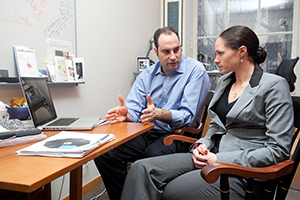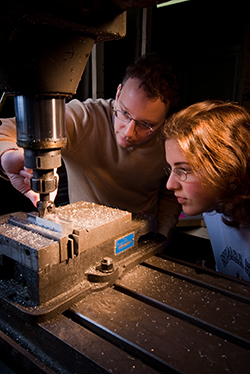Popping the Smart Bubble: Three Questions with Career Counselor Ellen Stahl
-
-
slice.mit.edu
- 5
Filed Under
Recommended

What is the MIT “smart bubble”? Students are at the top of their game when they come to MIT. They’ve been the highest achievers in high school, and whether they like it or not, they are labeled the “the smart ones.” When they get to MIT, they quickly realize that everyone is smart—they have entered the so-called smart bubble. This carries a number of challenges. When everyone around you is equally smart, your sense of self is diluted, your confidence is challenged, and it often takes time and resilience to recalibrate.
How can the “smart bubble” hinder an MIT grad entering the workforce or trying to change careers? Before graduating from MIT, a surprising number of soon-to-be grads don’t feel that they are worthy or hire-able. They really don’t realize how truly marketable they are. That lack of confidence is a symptom of the smart bubble that might continue further than one might expect.
I have been talking to alums 10, 20, even 30 years out, and many are still affected by it. Alums are doing great things—making impressive discoveries, publishing books, inventing new technologies—but I still think they struggle with this slight tinge of impostor syndrome created, in part, by the smart bubble.
I have seen the smart bubble reemerge when alumni are faced with networking. Alums interested in exploring a career transition from one field to another are wise to network and build relationships with those in their new area of interest. However, in their current jobs, many are the experts at what they do. The networking process can make them feel vulnerable, because for a new field, they don’t have all the answers, and this may re-ignite those smart bubble insecurities. This can be an obstacle when asking for help.
 "Alums interested in exploring a career transition from one field to another are wise to network and build relationships with those in their new area of interest."
"Alums interested in exploring a career transition from one field to another are wise to network and build relationships with those in their new area of interest."
What shapes does reflection take, and how crucial is it to reflect during different points in your career path? Everyone has their own personal code. When you figure out how to unlock yours, it gives you an enormous amount of information to determine what that ideal career is that will never feel like work.
That’s where reflection comes in. It’s an opportunity to take a pause and look back at your experiences and recall what provided fulfillment or disappointment or motivation. Working with a career counselor can help you get a clear picture of your career preferences, your innate aptitudes, and your existing skills and interests.
Reflection also gives you the permission to follow your own bliss on some level. Where do you want to make your impact? What expertise have you gained thus far that you’d like to bring to a new arena?
Donald Super, a pioneer in career development, argues in his Life-Span theory that people are constantly growing and changing, and being shaped and reshaped by their experiences. Reflection will only set you up for a higher level of satisfaction going forward in your career. In your career timeline, when you take the time to reflect, your career benefits will only grow exponentially.
Learn more about the new career guidance program. Alumni can also connect with employers through MIT’s Alumni Association LinkedIn group and Online Alumni Directory (OAD), research the employer database using MIT’s Career Bridge, sign up for a mentor with the Alumni Institute Career Assistance Network (ICAN), and gain career tips and resources from the Global Education & Career Development (GECD) website containing a series of workshops and webinars on everything from resume writing to LinkedIn.








Comments
Mike Neschleba
Mon, 03/03/2014 1:14pm
Think of an M.I.T. graduate as the technological equivalent of a Samurai sword: exquisite, very sharp, a marvel. But it must be wielded in the hands of an expert in order to show its powers. Many managers do not have the skills to use an M.I.T. graduate to full potential. They use the sword to pound nails. Good managers assign these brightest contributors to the most demanding projects and then challenge them to push the envelope. Over a long career I have worked for both types, and my advice would be to spend as little time as possible with the clueless ones.
Ken M
Sun, 03/02/2014 1:52am
The smart bubble is real -- I've heard accomplished, recognized engineers complain about falling prey to the imposter syndrome over and over. It does help to gain some perspective about where you stand on in relation to others.
Example: I was one of the best science and math students at my high school, but 8.022 (EM f0r masochists) completely kicked my ass -- the first time I faced physics problems that I simply could not solve, could not even figure out how to start solving them, but there were students who could whip out the answer almost by inspection. Example 2: After a couple of years at MIT, I was proud of starting to speak a second language with some fluency, but there was a woman I met who was fluent in five -- and complained that she couldn't remember more than 6 or 7 at a time.
Counter-example: In high school, I was considered socially inept (to be generous). At MIT, I was in the middle of the pack -- I had attended a few parties and even went to my senior prom. And by the time I graduated, I had managed to meet and to start dating seriously the woman who would become my wife two years later.
The key is to maintain some perspective on your shortcomings *and* your accomplishments, to remember it's normal when you're painfully reminded that you aren't the smartest person around, and just as normal to find out that you aren't the dumbest one either.
ep
Thu, 02/27/2014 12:44pm
Smart bubble aftereffects had plagued me for 3 decades. In my case it was based on a belief that accomplishment and knowledge are the only metrics of personal worth, and no amount of reality checks, of someone telling me how well I was actually doing would help. Only after changing my belief of worth from being based on "doing" to being based on "being" did I get relief. Ironically I've become capable in my technical capacity, once I can get out of my own way.
Cynthia McInytre
Thu, 02/27/2014 10:56am
Very insightful article. Thank you.
Kathryn James
Wed, 02/26/2014 11:02am
I have three degrees in EE from MIT (SB, SM and Degree of EE), all of which I earned before I turned 22. I did not experience the issue you describe. I just worked harder than everybody else, frequently pushing myself beyond my own limits. I was treated very badly during my career because I am female. I don't really believe that women can have equal opportunity while men walk the face of the earth. I am retired now and though I would like to work, the very thought of how I would be treated by men makes me ill. From what I have seen in the workforce, nothing has really improved for women over the past 40 years. They are still marginalized and underutilized.